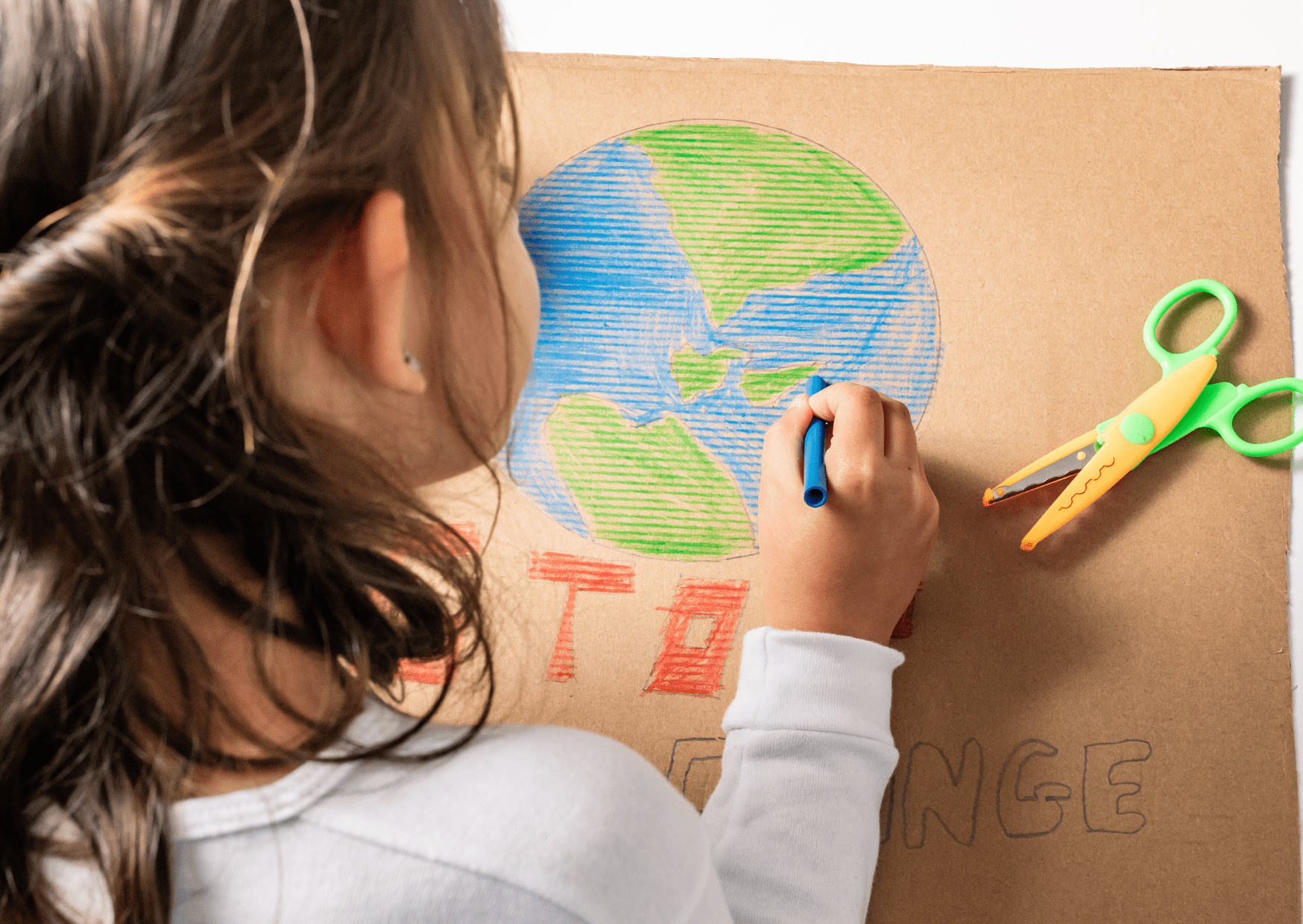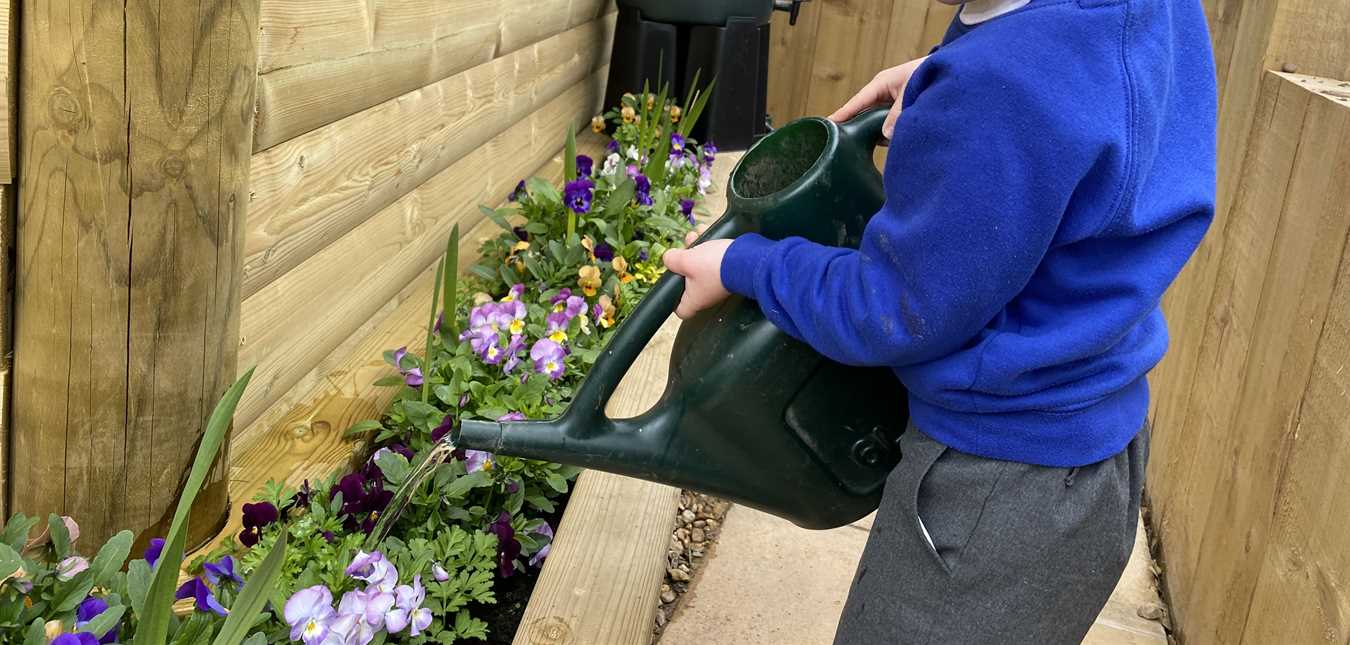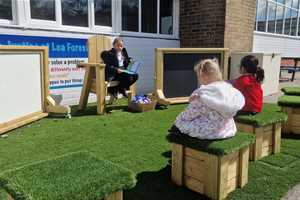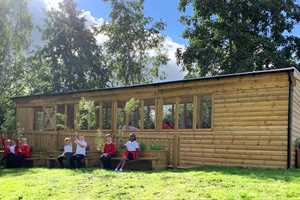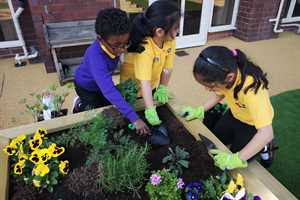
Outdoor Learning and Play
How Your School Can Fight Climate Change
Schools can play a pivotal role in combating climate change by looking at the ten eco schools topics (biodiversity, energy, global citizenship, healthy living, litter, marine, school grounds, transport, waste and water) and integrating some of these eco-friendly practices into their daily operations and curriculum.
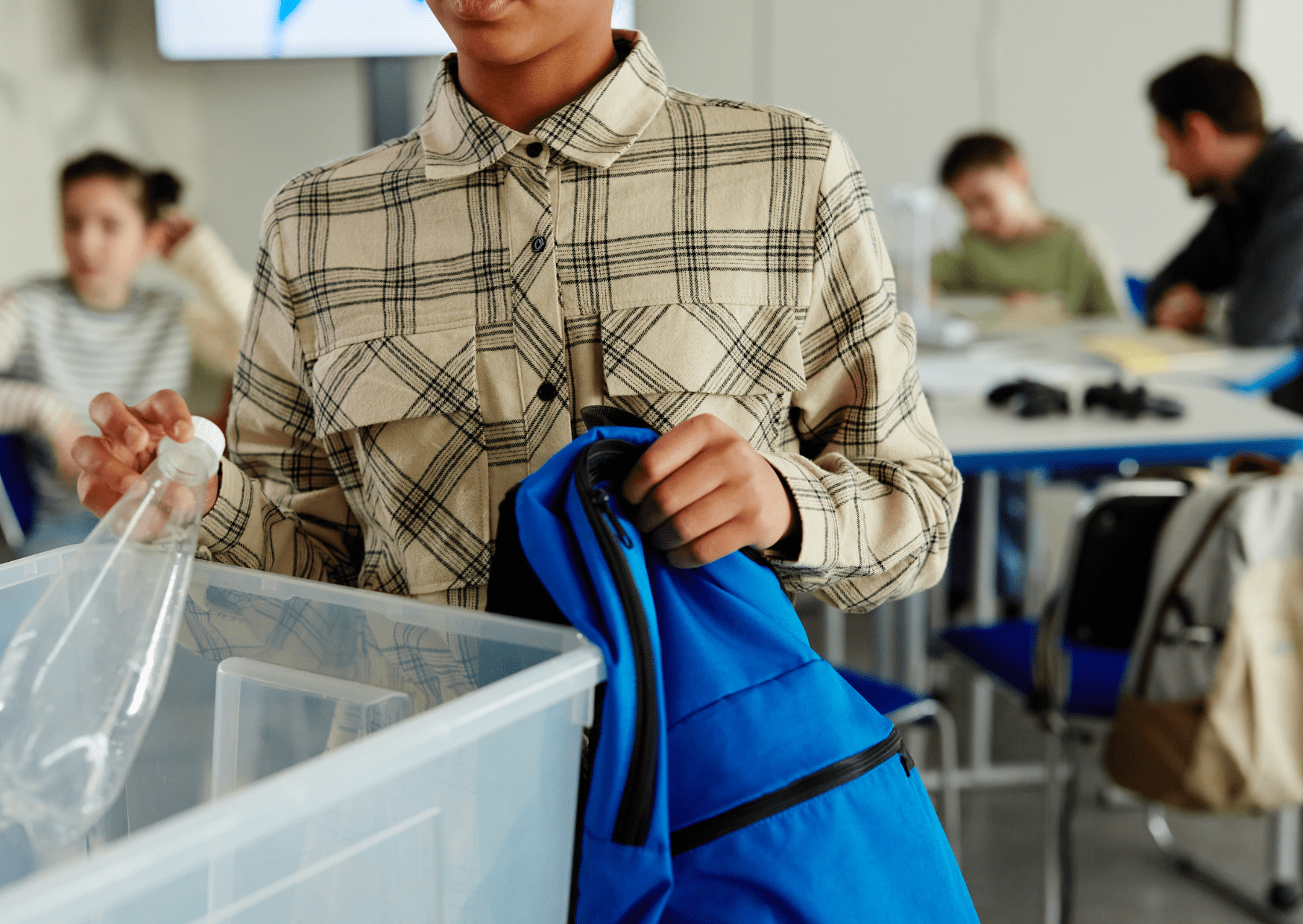
Schools can form an eco committee (pupils and teachers) who can pioneer the schools programme to become an eco friendly school. The eco committee can gain an eco schools green flag, an award given to schools in the UK for demonstrating a commitment to environmental education and sustainable practices.
Here is the seven step framework that a school needs to do to achieve the eco schools green flag award:
- Forming an Eco-Committee: A group of students and staff who lead the school’s environmental initiatives.
- Conducting an Environmental Review: Assessing the school’s current environmental impact.
- Creating an Action Plan: Setting goals and outlining steps to improve sustainability.
- Monitoring and Evaluating Progress: Regularly checking the effectiveness of the initiatives.
- Linking to the Curriculum: Integrating environmental education into various subjects.
- Involving the Whole School and Wider Community: Engaging everyone in the school’s sustainability efforts.
- Create an Eco-Code: A written statement that mirrors the school's commitment to the environment.
Once an eco committee has been formed, the committee can conduct an environmental review of the school inline with the seven step framework and create an eco schools programme for the school to follow. Which in turn will lead to the school gaining an eco schools green flag.
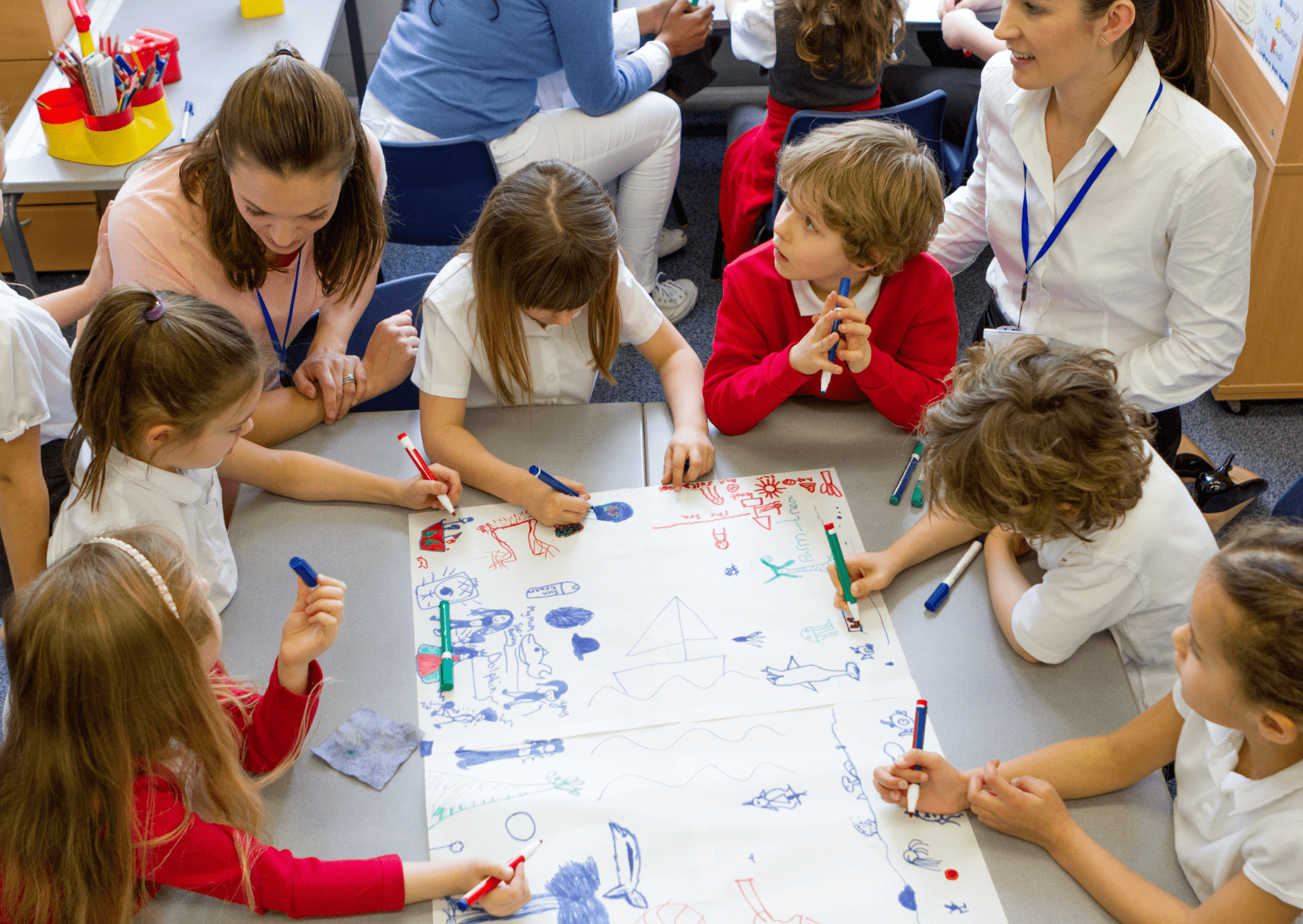
Eco Friendly Ideas for Schools Programme:
Here are some ideas on how school can become eco friendly schools:
- One effective approach is to install renewable energy sources, such as solar panels and small wind turbines, which can significantly reduce the school’s carbon footprint while also serving as educational tools for pupils.
- Promoting sustainable transportation options, like bike-to-school programs and carpooling, can further decrease emissions. Schools can also enhance their infrastructure and become a green school by incorporating green roofs and walls, which improve insulation and reduce the urban heat island effect, and by creating rain gardens to manage stormwater and support local biodiversity.
- Energy efficiency measures, such as replacing old lighting with LED bulbs and using smart thermostats, can help conserve energy. Waste reduction initiatives, including comprehensive recycling programs and composting organic waste, can minimize the school’s environmental impact.
- Incoroprating educational eco schools programme are crucial for raising awareness and inspiring action. Integrating climate change topics into the curriculum and organizing workshops with guest speakers can empower pupils to become environmental stewards.
- Establishing school gardens and pollinator gardens can enhance the environmental education and teach pupils about sustainable agriculture and support local ecosystems.
By implementing an eco schools programme and eco-friendly concepts into every day school life, schools can work towards attaining an eco schools green flag. While at the same time contribute to the fight against the change in our climate but also increase environmental awareness and foster a culture of sustainability among pupils and staff.

By incorporating Pentagon Play’s eco-friendly products into your school environment, your school can become one of the many eco schools around the UK. This is how your school can work towards becoming a green school and gaining a eco schools green flag!
Upgrade To Artificial Grass
Pentagon Play offers a wide range of Artificial Grass options for the school outdoor environment from Playturf to our Artificial Grass Daily Mile.
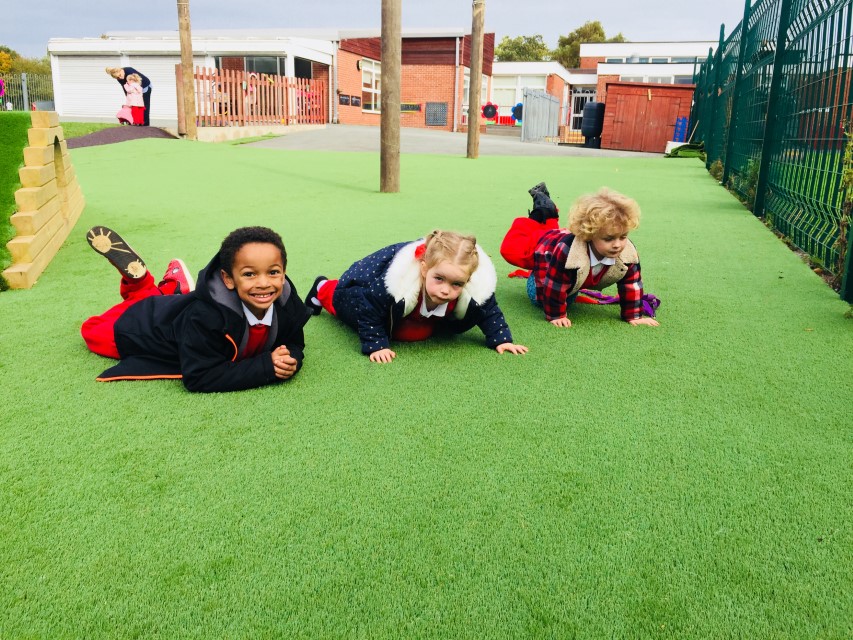
Artificial grass offers several eco-friendly advantages over natural grass, particularly when considering the environmental impact of maintenance and reducing plastic pollution.
Benefits of Artificial Grass:
- One of the most significant benefits is that Artificial Grass does not require mowing. Traditional lawn maintenance involves the use of lawnmowers, which are often powered by fossil fuels. These machines emit greenhouse gases, contributing to air pollution and changes in climate. By eliminating the need for mowing, Artificial Grass reduces the carbon emissions and footprint associated with lawn care.
- In addition to reducing emissions from lawnmowers, Artificial Grass also conserves water. Natural grass lawns require regular watering to stay healthy and green, especially during dry seasons. This can lead to significant water consumption, which is a critical concern in areas facing water scarcity. The benefit of Artificial Grass, on the other hand, requires no watering, and therefore has zero waste, thereby conserving this precious resource.
- Furthermore, Artificial Grass eliminates the need for fertilizers and pesticides, which are commonly used to maintain natural lawns and which cause environmental issues. These chemicals can run off into local waterways, causing pollution and harming aquatic ecosystems. By opting for Artificial Grass, schools can reduce their reliance on these harmful substances, promoting a healthier environment.
- Another eco-friendly aspect of Artificial Grass is its durability and longevity. High-quality Artificial Grass is a great long-lasting resource. Due to its longevity, there is less need to replace it. Therefore it is more cost effective, as well as having a reduced impact on the environment when producing and transporting it. Plus, many Artificial Grass products are made from recycled materials, further enhancing their sustainability.
- While there are some environmental considerations to keep in mind, such as the initial production and eventual disposal of Artificial Grass, the overall reduction in water usage, chemical application, and fossil fuel consumption makes it a more eco-friendly option compared to natural grass and better for our planet.
By choosing one of Pentagon Play’s Artificial Grass products, schools can significantly reduce their environmental impact and contribute to the fight against climate change for our young people. Whilst at the same time striving to be an eco school and having a highly functional and aesthetically pleasing environment for your pupils to learn and play in.
Use Environmentally Friendly Fencing
Environmentally friendly fencing, such as Pentagon Play’s Bow Top Timber Fencing, Robinia Fencing, and Willow Fencing, is an excellent way for schools to combat changes in climate and work towards becoming one of many eco schools in the UK.
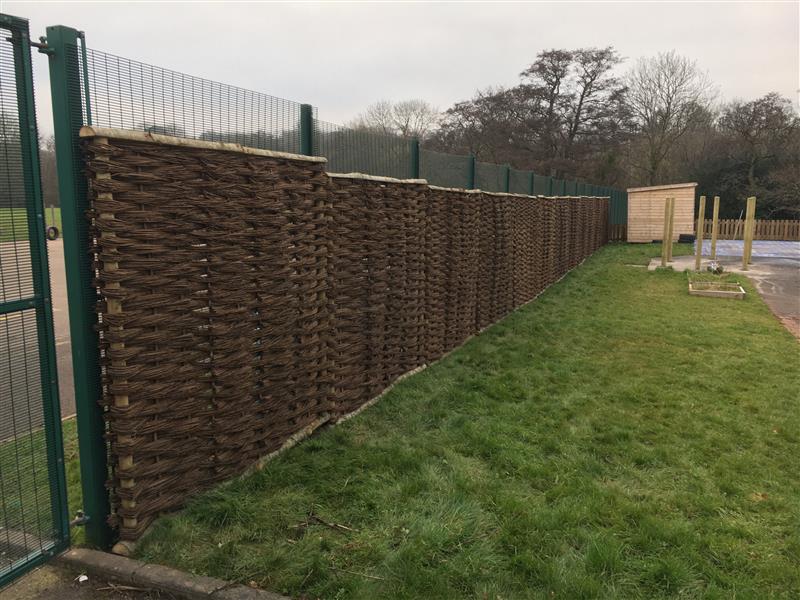
These fences are made from natural, sustainable materials that have a significantly lower environmental impact compared to traditional fencing options.
Pentagon Plays Fencing:
- Timber Fencing: One of the primary benefits of using natural materials is their ability to sequester carbon. For example, timber used in Bow Top Timber Fencing and Robinia Fencing absorbs carbon dioxide as it grows, helping to offset greenhouse gas emissions. Additionally, these materials are biodegradable, reducing waste and pollution at the end of their life cycle.
- Willow Fencing: Is another eco-friendly option that offers numerous environmental benefits. Willow is a fast-growing plant that requires minimal resources to cultivate. It can be woven into durable and aesthetically pleasing fences that blend seamlessly with natural surroundings. The use of willow also supports biodiversity, providing habitats for various wildlife species in our country.
- Metal Fencing: Is a robust and eco-friendly option for schools. Its durability (being made from galvanised and powder-coated steel) ensures long-term use, minimising the need for replacements and further conserving resources, making it an excellent choice for environmentally conscious eco schools.
In addition to the materials used, environmentally friendly fencing often involves sustainable manufacturing processes. These processes aim to minimise waste, reduce energy consumption, and limit the release of harmful pollutants.
Schools can work towards gaining the eco schools green flag award by supporting sustainable practices by choosing eco-friendly fencing and aiding a greener economy. Moreover, environmentally friendly fencing can enhance any school’s overall sustainability efforts. It can be integrated with other green initiatives, such as creating wildlife habitats or supporting local biodiversity.
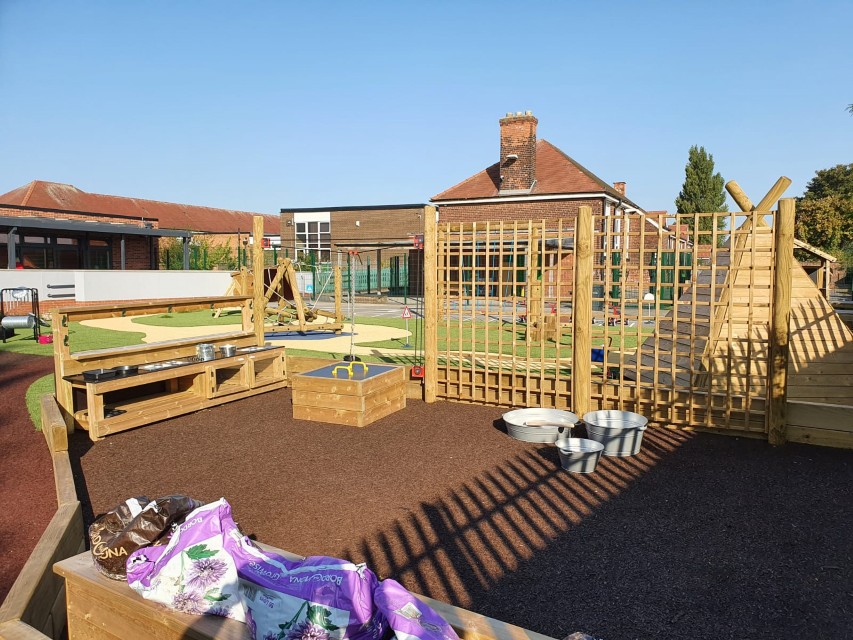
In summary, environmentally friendly fencing, like that from Pentagon Play, is a strong eco-friendly option for eco schools. Thus, reducing the environmental impact of fencing materials and supporting sustainability goals, aiding the fight against changes in climate.
By implementing such fencing, schools can create a more sustainable and environmentally conscious environment for their pupils, the local community and our next generation.
Create A School Garden
Creating a school garden is part of the seven steps and is an excellent way to promote plant growth and educate pupils during action based learning about the importance of protecting the environment.
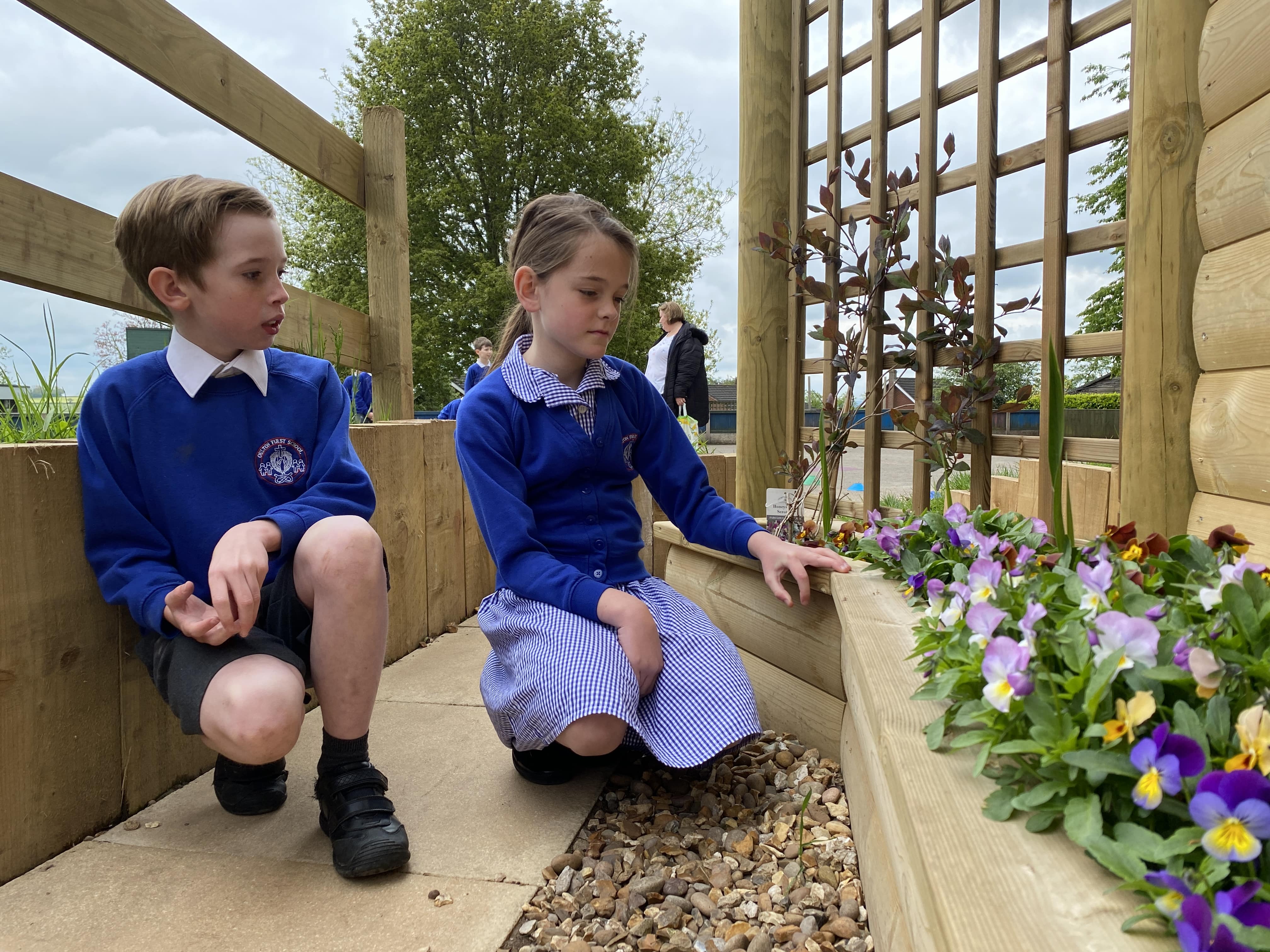
School gardens provide a hands-on learning experience, allowing pupils to engage directly with nature. This interaction helps them understand the life cycle of plants, the importance of biodiversity, and the role of plants in maintaining a healthy ecosystem.
Pentagon Plays Hexagonal Secret Garden Gazebo and Planters are the perfect resources to include in any eco schools outdoor environment.
Here are some reasons why:
1. Sustainable Practices:
Gardening teaches young people about sustainable practices, such as composting, water conservation, and organic farming. These lessons can foster a sense of responsibility and stewardship for the environment and learn about current environmental issues.
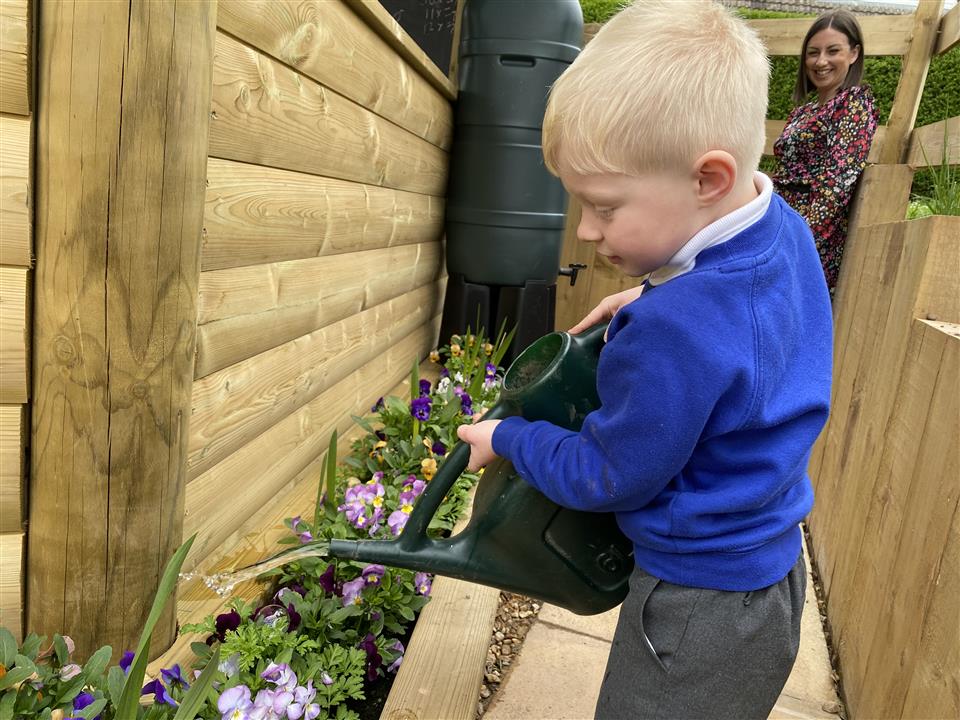
By participating in the planting, nurturing, and harvesting of crops, pupils gain a deeper appreciation for the natural world, our planet and the resources it provides.
2. Sustainable Materials:
Pentagon Play’s Secret Garden Gazebo and Planters, made from sustainable materials, further enhance the eco-friendly nature of school gardens. The Gazebo and Planters are designed to be durable and environmentally friendly, reducing the need for frequent replacements and minimising waste. Using sustainable materials also supports the broader goal of reducing eco schools carbon footprint and promoting sustainability.
3. Improves Mental Health:
In addition to environmental benefits, school gardens can improve mental and physical well-being in young people. Gardening activities can reduce stress, enhance mood, and provide a sense of accomplishment.
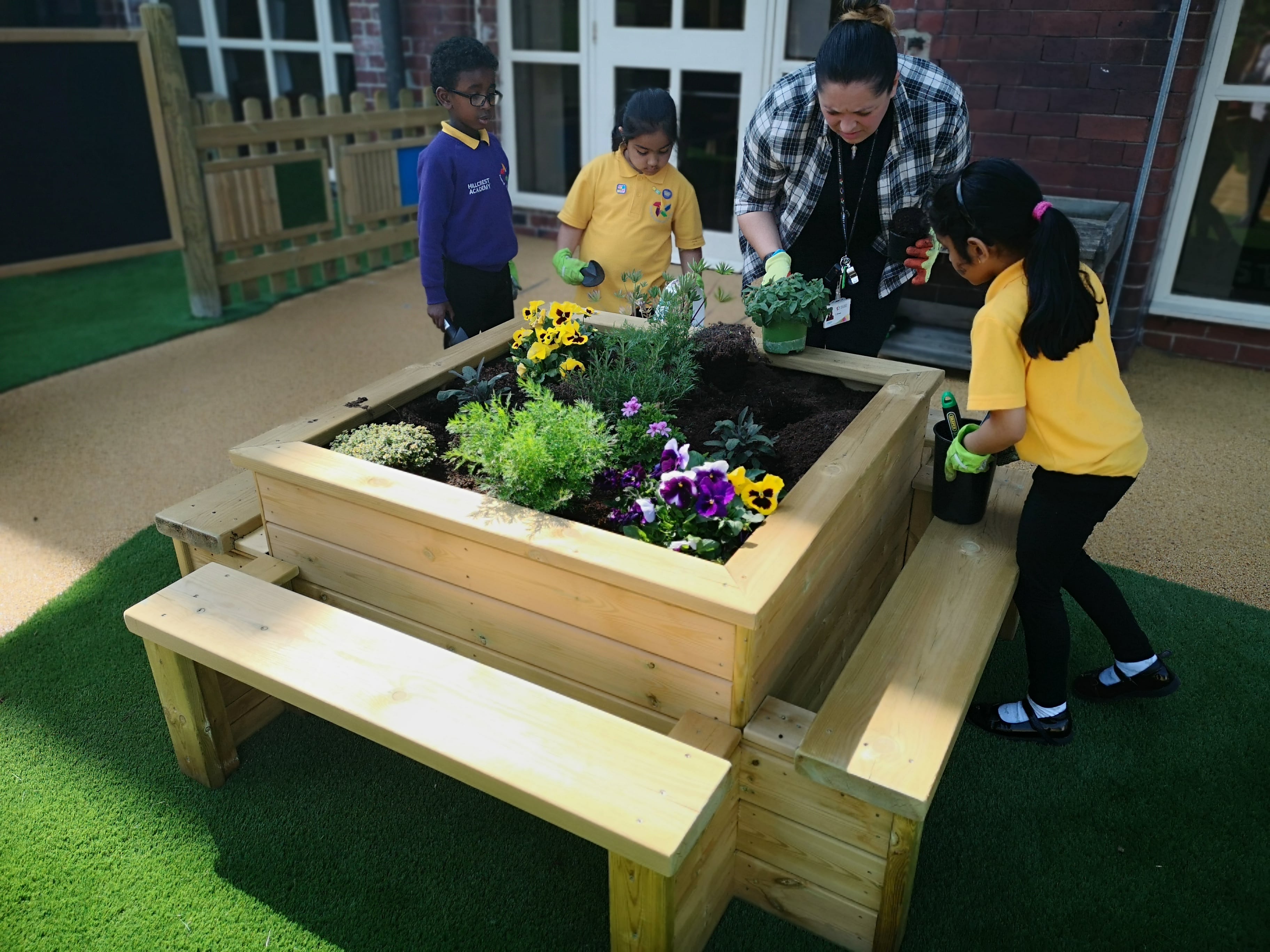
They also encourage physical activity and outdoor learning, which are essential for overall health and development.
4. Creates A Community:
Moreover, school gardens can serve as a community hub, bringing together pupils, educators, parents, and local organisations to work towards a common goal. This collaboration can strengthen community bonds and foster a collective commitment to environmental conservation now and for the next generation.
In summary, creating a school garden with Pentagon Play’s sustainable Secret Garden Gazebo and Planters is a powerful and nurturing way to promote plant growth, educate pupils about environmental protection, and support a healthier, more sustainable eco schools communities.
Different Types Of Gardens And Eco-Friendly Activities...
As part of the seven steps, school eco committees can create different types of gardens and do eco-friendly activities as part of their eco friendly schools programme:
1. Vegetable Garden:
Setting up a vegetable garden in a primary school is an excellent eco-friendly practice that offers numerous benefits. It provides a hands-on learning experience, teaching pupils about sustainable agriculture, plant biology, and the importance of healthy eating. By growing their own vegetables, pupils learn about the life cycle of plants and the value of fresh, locally-grown produce.
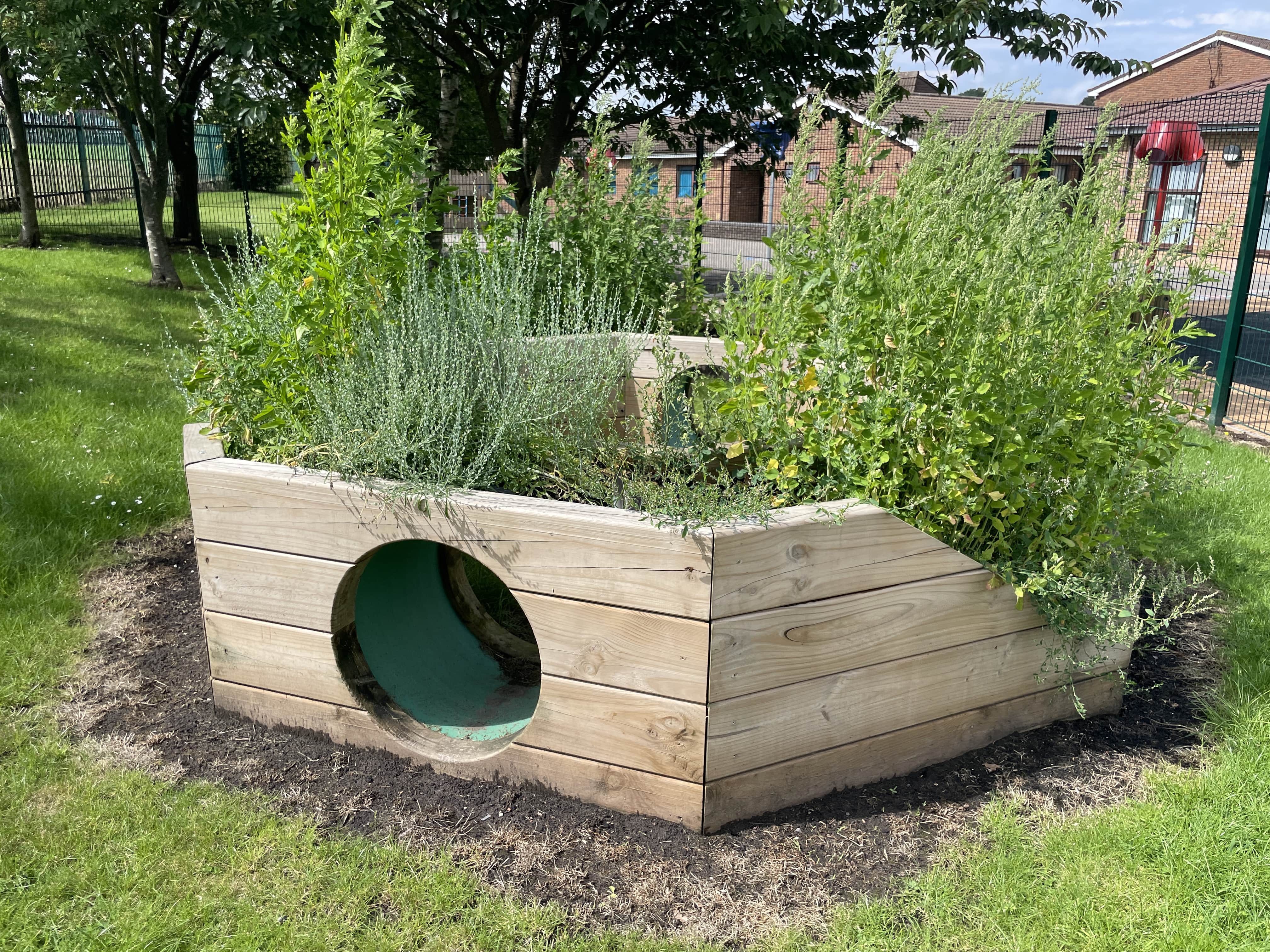
A school vegetable garden also promotes environmental stewardship. It reduces the carbon footprint associated with transporting food and minimises waste by composting garden scraps. Using Pentagon Play’s sustainable Planters further enhances the garden’s eco-friendliness, as these Planters are made from environmentally responsible materials.
Additionally, gardening encourages outdoor activity, fostering physical health and well-being. It can also serve as a public project, involving pupils, educators, and parents in a collaborative effort to care for the environment. Overall, a school vegetable garden is a practical and impactful way to educate young minds about sustainability and environmental responsibility.
2. Pollinator Garden:
Setting up a pollinator garden in eco schools is an excellent eco-friendly practice that supports local ecosystems and educates pupils about environmental conservation.
These gardens are designed to attract insects that help pollinate the plants and maintain the biodiversity of the garden e.g. bees, and butterflies. By planting a wide variety of native flowers in your Planters or Secret Garden Gazebos, schools can create a wonderful habitat for these insects to pollinate.
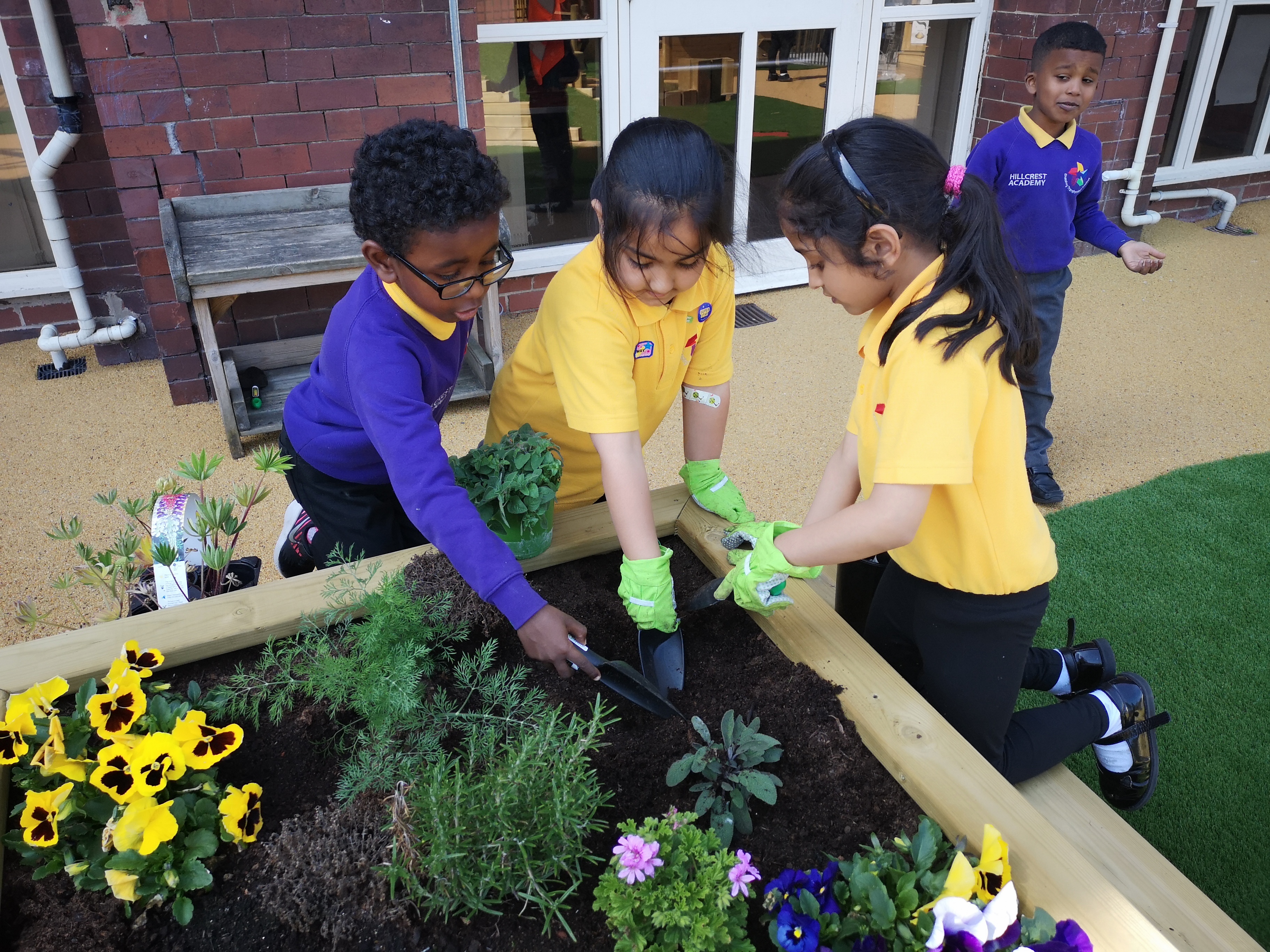
Pentagon Play’s Bug Hotels and Wildlife Areas, are also made from sustainable materials and can be added to school gardens to house these pollinators.
This hands-on project teaches pupils about the importance of pollinators in food production and ecosystem health. It also fosters a sense of responsibility and stewardship for the environment.
To conclude, pollinator gardens are a fantastic way to get young people involved in understanding why insects are needed to increase pollination, enhance biodiversity, and educate our children in a practical, hand-on way.
3. Composting:
Composting in primary schools is an excellent environmental action and eco-friendly practice that reduces waste and enriches soil. School's organic waste like food waste and garden clippings can be placed in compost bins, helping to reduce methane emissions and improving sustainability. The compost produced can be used in school gardens, enhancing soil health and plant growth.
Educating students about composting fosters environmental stewardship. Children can learn about the decomposition process, the importance of reducing waste, and the benefits of recycling organic materials during science lessons and environmental studies in a fun, hands-on environment.
Additionally, composting encourages a sense of responsibility and communal involvement. Pupils, educators, and staff can collaborate on maintaining the compost system, reinforcing teamwork, hard work, focus, and shared environmental goals. Composting is a fantastic practical and educational way for primary schools to promote eco-friendly practices and sustainability.
4. Rainwater Harvesting:
Rainwater harvesting is an eco-friendly practice that involves collecting and storing rainwater for later use, particularly beneficial for UK school gardens. Rainwater barrels to plastic bottles can be installed in schools to capture any runoff rainwater from roofs and other surfaces.
This practice supports sustainable water management, which is especially important in regions prone to water shortages. It also helps reduce the risk of flooding and soil erosion. The rainwater collected can be used to irrigate school gardens and plants.
Educationally, it provides a hands-on learning experience for pupils, teaching them about the water cycle, conservation, and sustainable practices. Allowing pupils to harvest rainwater and use it to water the school’s garden and plants fosters environmental stewardship and encourages children to adopt eco-friendly habits.
Overall, rainwater harvesting is a practical and impactful way for UK schools to promote sustainability.
Create A Bug Hotel
Creating a school Bug Hotel or Wildlife Area is an excellent way to promote insect biodiversity and educate students about environmental conservation. Bug hotels provide safe habitats for beneficial insects like bees, ladybugs, and beetles, which are essential for pollination and pest control. By supporting these insects, schools can help maintain healthy ecosystems and enhance plant growth in their gardens.
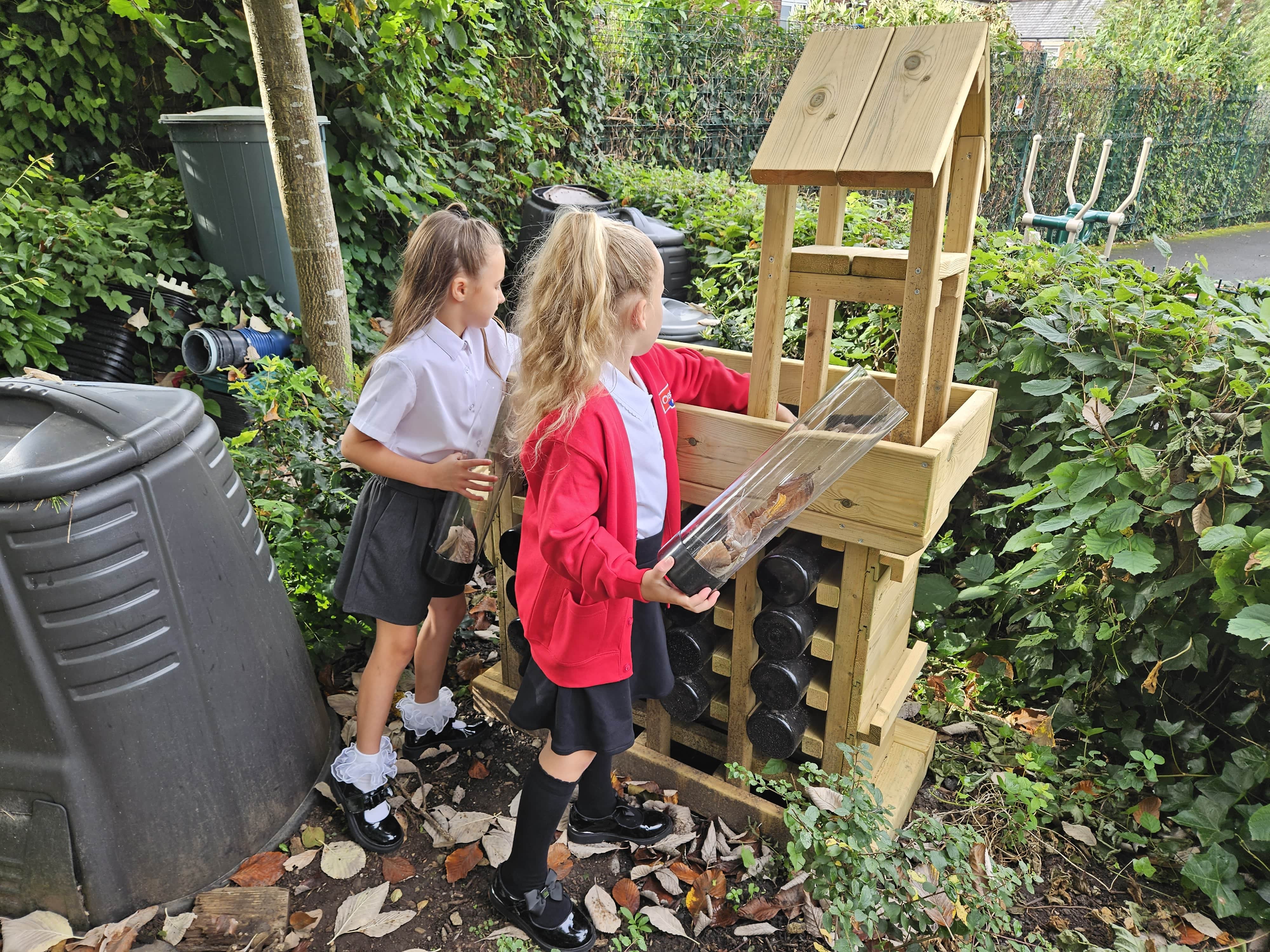
Pentagon Play’s Bug Hotel and Wildlife Area are made from high-pressure treated “play grade” timber, which is sustainably obtained, further emphasizing their eco-friendly nature. These materials are responsibly sourced, reducing environmental impact and promoting sustainability.
Incorporating Bug Hotels and Wildlife Areas into the school environment offers numerous educational benefits. Pupils can observe insect behaviours and learn about their life cycles, habitats, and contributions to the ecosystem.
Moreover, creating Bug Hotels can be integrated into the curriculum through science and environmental studies. Teachers can use these projects to teach lessons and further information on biodiversity, conservation, and the interdependence of living organisms.
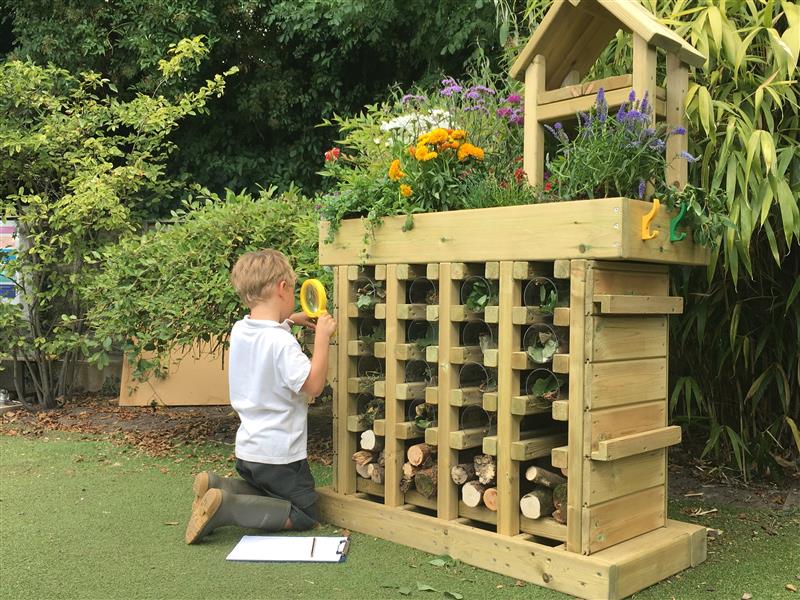
Additionally, Bug Hotels and Wildlife Areas can serve as public projects, involving students, teachers, parents, and local organizations.
In summary, creating a school Bug Hotel or Wildlife Area with Pentagon Play’s sustainable materials is a powerful way to support insect populations, educate students about environmental protection, and foster a culture of sustainability within the school community.
Select An Eco Friendly Playground Surfacing Option
Playground surfacing can be environmentally friendly, especially with options like Bonded Rubber Mulch and Safermats. These surfaces are designed to provide safe play areas for education, while minimizing environmental impact. Let's take a closer look at them:
Bonded Rubber Mulch:
Bonded Rubber Mulch is made from recycled tires, which helps address the significant waste disposal problem associated with used tires. The tires are shredded into small pieces and then bonded together with a non-toxic adhesive to form a solid, cushioned surface.
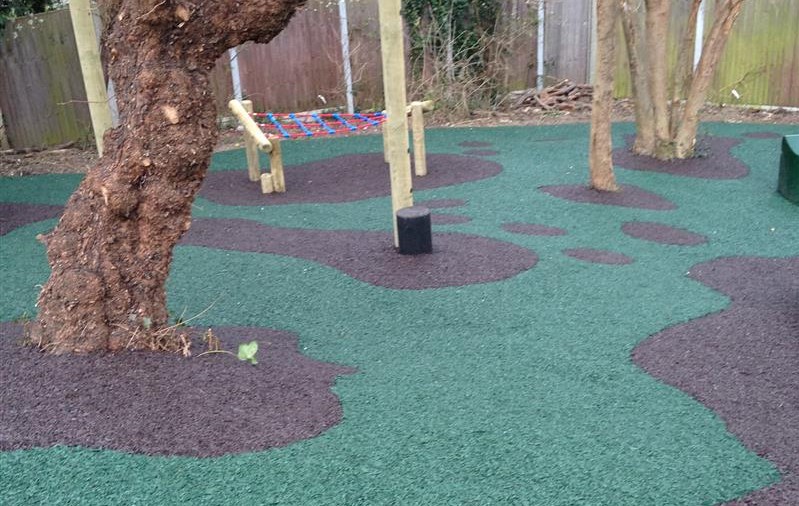
Being recycled, Bonded Rubber Mulch reduces the need for new raw materials and therefore conserves natural resources. Also Bonded Rubber Mulch is highly durable and need little maintenance making it a great resource as it doesn't need replacing often and therefore reduces its environmental footprint.
Pentagon Play has a range of Bonded Rubber Mulch Products like our Earth Brown Playbond, or we can create a Bespoke Playbond Design in schools or colleges outdoor areas. It can feature several colours with a seamless finish creating an instant visual impact in any school playground. It can be installed directly over grass or tarmac without any expensive or intrusive base work preparation.
Safermats:
Safermats are another eco-friendly playground surfacing option. Pentagon Plays Safermats are made from durable recycled rubber, similar to Bonded Rubber Mulch. The production process involves shredding recycled rubber and molding it into mats that can be laid over playground surfaces.
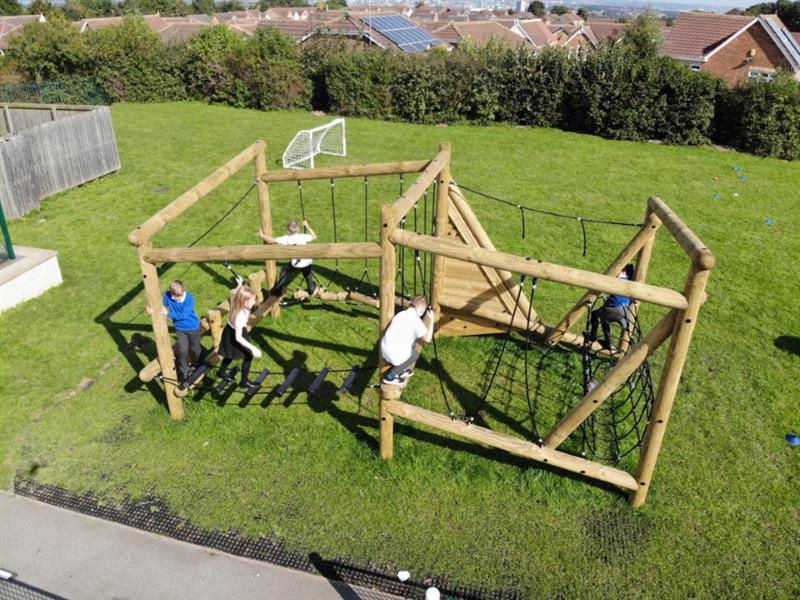
Safermats provide excellent shock absorption, reducing the risk of injuries from falls. They are also permeable, letting water drain through them, reducing the risk of puddles and slips.
The use of recycled materials in Safermats helps divert waste from landfills and reduces the demand for new rubber production, making them a sustainable choice for schools and colleges.
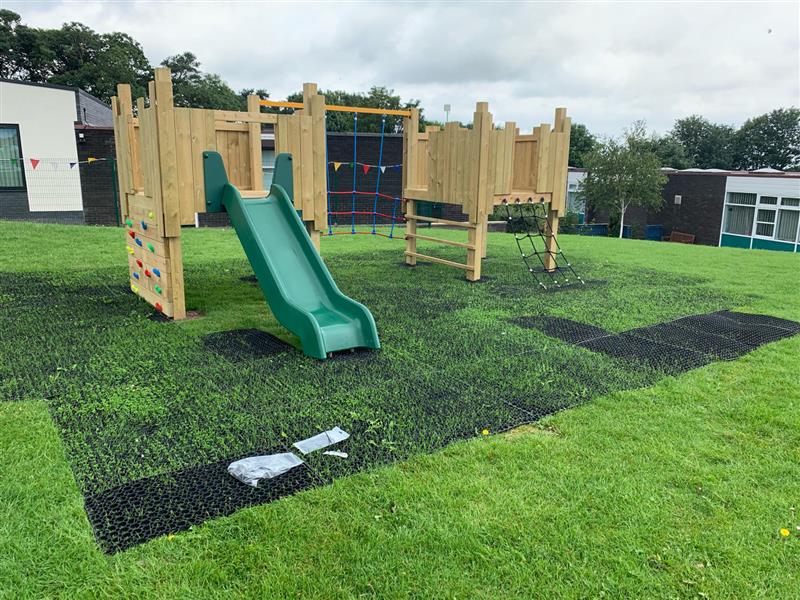
Both Bonded Rubber Mulch and Safermats offer significant environmental benefits. By using recycled materials, they help reduce waste and conserve natural resources. Their durability and low maintenance requirements mean they have a longer lifespan, reducing the need for frequent replacements and the associated environmental costs.
Schools can create sustainable and safe play areas using these eco-friendly surfacing options whilst at the same time supporting the environmental conservation needs of the eco schools programme.
Through the efforts of a schools eco committee and running an eco schools programme inline with the eco schools flag award, schools can work towards becoming eco schools. One easy step to help schools become more green is by using some of Pentagon Play's sustainable and eco-friendly outdoor resources.
